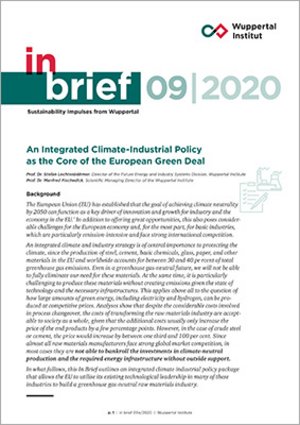An Integrated Climate-Industrial Policy as the Core of the European Green Deal
Sustainability Impulse from Wuppertal

The European Union (EU) has established that the goal of achieving climate neutrality by 2050 as a key driver of innovation and growth for industry and the economy in the EU. In addition to offering great opportunities, this also poses considerable challenges for the European economy and, for the most part, for basic industries, which are particularly emission-intensive and face strong international competition.
An integrated climate and industry strategy is of central importance to protecting the climate, since the production of steel, cement, basic chemicals, glass, paper, and other materials in the EU and worldwide accounts for roughly one fifth of total greenhouse gas emissions. Even in a greenhouse gas-neutral future, we will not be able to fully eliminate our need for these materials. At the same time, it is particularly challenging to produce these materials without creating emissions given the state of technology and the necessary infrastructures. This applies above all to the question of how large amounts of green energy, including electricity and hydrogen, can be produced at competitive prices. Analyses show that despite the considerable costs involved in process changeover, the costs of transforming the raw materials industry are acceptable to society as a whole, given that the additional costs usually only increase the price of the end products by a few percentage points. However, in the case of crude steel or cement, the price would increase by between one third and 100 per cent. Since almost all raw materials manufacturers face strong global market competition, in most cases they are not able to bankroll the investments in climate-neutral production and the required energy infrastructure without outside support.
This paper outlines an integrated climate industrial policy package that allows the EU to utilise its existing technological leadership in many of these industries to build a greenhouse gas-neutral raw materials industry.
